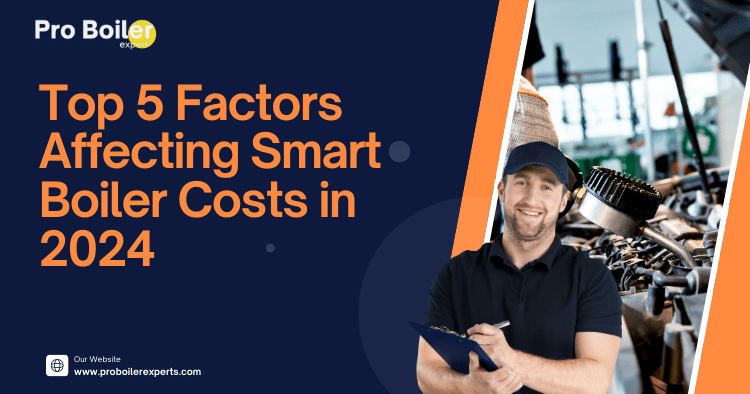Table of Contents
- Introduction
- 1. Type of Smart Boiler
- 2. Installation Complexity
- 3. Energy Efficiency Ratings
- 4. Brand Reputation and Warranty
- 5. Available Features and Technology
- Conclusion
- FAQs
Introduction
As we step into 2024, the demand for smart boilers is on the rise, fueled by a push for energy efficiency and smart home technology. However, understanding the costs associated with these advanced heating systems can be daunting. Smart boilers not only offer improved performance but also come with varying price points based on several factors. In this article, we will explore the top five factors that affect smart boiler costs in 2024, helping you make an informed decision for your home heating needs.
1. Type of Smart Boiler
Smart boilers come in different types, each tailored to specific heating needs. The primary types include:
- Combi Boilers: These are compact and provide both heating and hot water on demand, making them ideal for smaller homes. They typically cost between $2,500 and $5,000. For more on their benefits, see Top 5 Benefits of Choosing Combi Boilers for Your Home.
- System Boilers: These require a cylinder for storing hot water but offer more efficiency for larger homes. Prices range from $3,000 to $6,000. For additional insights, check Top 5 Benefits of Choosing a System Boiler for Your Home.
- Regular Boilers: Also known as traditional or conventional boilers, these are suitable for homes with existing hot water storage systems. They can cost between $3,000 and $7,500. More information can be found in Top 5 Benefits of Conventional Boilers for Your Home.
When choosing a boiler type, consider not only the initial cost but also the long-term efficiency and suitability for your household’s needs.
The choice you make will significantly influence the overall cost, so consider your household’s hot water needs and space availability when selecting your boiler type.
2. Installation Complexity
The installation process for smart boilers can vary greatly depending on your home’s existing infrastructure. Key factors influencing installation costs include:
- Existing System Compatibility: If you’re replacing an old boiler, the compatibility with existing piping and electrical systems can affect the installation cost.
- Location: A boiler located in a hard-to-reach area may require extra labor, increasing installation costs.
- Local Regulations: Some areas have specific codes that might necessitate additional work, such as installing new ventilation systems.
Always consult with a licensed professional to ensure you understand all potential costs involved in the installation process.
On average, installation costs can range from $1,000 to $3,000, but this can increase based on the complexity of the job. Always get a quote from a licensed professional to understand the total cost involved. For more details about the installation process, refer to Installation Day: What to Expect for Your New Boiler.
3. Energy Efficiency Ratings
Energy efficiency is a significant factor in the overall cost of smart boilers. Boilers are rated based on their Seasonal Efficiency of Domestic Boilers in the UK (SEDBUK) or the Annual Fuel Utilization Efficiency (AFUE) in the U.S.
| Efficiency Rating | Description | Estimated Cost Impact |
|---|---|---|
| 90%+ | Highly efficient | +$500 – $1,000 |
| 80% – 89% | Moderately efficient | Standard Pricing |
| Below 80% | Low efficiency | -$500 |
Investing in a higher efficiency model may have a higher upfront cost, but the potential savings on energy bills can make it a worthwhile decision.
Higher efficiency models typically have a higher upfront cost but can save you money on energy bills in the long run. It’s worth considering the long-term savings when selecting a boiler. For further information on efficiency, see Top 5 Energy Efficient Boiler Types for 2024.
4. Brand Reputation and Warranty
The brand of the boiler you choose can greatly impact the cost. Well-known brands often provide higher price tags due to their reputation for reliability and customer service. Additionally, a good warranty can save you money in the long run, as it protects you from unexpected repair costs.
- Top Brands: Brands like Worcester Bosch, Vaillant, and Ideal have established themselves as leaders in the industry, often coming with a higher price but offering peace of mind. For a detailed comparison, check Worcester Bosch Boilers: Comprehensive Brand Comparison.
- Warranty Length: A boiler with a lengthy warranty (usually 5 to 10 years) can be more expensive upfront but can save you money on repairs and replacements, making it a smart investment.
Choosing a reputable brand with a solid warranty can be a safety net for your investment, ensuring long-term support and reliability.
When purchasing a smart boiler, always consider the brand’s reputation and warranty offerings to ensure you’re making a wise investment.
5. Available Features and Technology
Smart boilers come equipped with various features that enhance their performance and convenience. Some of the most sought-after features include:
- Wi-Fi Connectivity: Allows for remote control and monitoring via smartphone apps. This feature may add $100 to $300 to the boiler cost.
- Smart Thermostats: Integrated smart thermostats can optimize heating schedules based on your habits and preferences, potentially costing an additional $200 to $500. For more options, see Top 5 Smart Thermostats to Boost Boiler Efficiency.
- Self-Diagnosis: Many smart boilers include self-diagnosis features that can alert you to problems before they escalate, possibly increasing the price by $100 to $200.
While advanced features can enhance your boiler’s functionality and efficiency, it’s essential to assess which features align with your lifestyle and budget.
While these features can enhance convenience and efficiency, they also contribute to the overall cost. Be sure to weigh the benefits against the added expenses to determine what features are essential for your home.
Conclusion
Understanding the factors that affect smart boiler costs is crucial for making an informed decision. By considering the type of boiler, installation complexity, energy efficiency, brand reputation, and available features, you can find a smart boiler that fits your budget and meets your heating needs. As you navigate the options available in 2024, keep these factors in mind to ensure you invest wisely in your home’s heating system.
FAQs
1. What is the average cost of a smart boiler in 2024?
The average cost of a smart boiler ranges between $2,500 and $7,500, depending on the type and features.
2. How long do smart boilers typically last?
Smart boilers generally last between 10 to 15 years with proper maintenance.
Regular maintenance is key to extending the lifespan of your boiler and maximizing its efficiency.
3. Are smart boilers worth the investment?
Yes, while the initial cost may be higher, smart boilers can lead to significant savings on energy bills and provide increased convenience.
4. Can I install a smart boiler myself?
It’s not recommended. Installation should be performed by a certified professional to ensure safety and compliance with local regulations.
For more information on smart boilers, consider checking out Energy.gov for energy efficiency resources.




